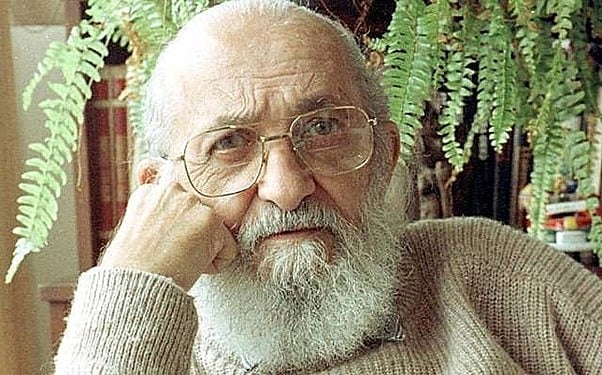This Sunday (2) is the 24th anniversary of the passing of educator and philosopher Paulo Freire, who died of a heart attack on May 2, 1997. Most of his 75 years were dedicated to the creation of innovative methods of education that centered on social transformation. That made the white-bearded man with round spectacles – and his work – internationally recognized.
Paulo Freire is Brazil’s most commemorated citizen, author of almost 40 books, and winner of dozens of titles of Doctor Honoris Causa from universities all over Europe and the Americas. In 1986, he received the UNESCO Prize of Peace Education.
Patron of Brazilian education, Freire’s method of teaching and learning is employed all over the world and relies on the humanization of teaching and on the recognition of the students’ history and culture. In Freirean perspective, students are active parts of the learning process as much as teachers, resulting in a horizontal process in which everyone teaches and learns.
Paulo Freire’s first experiences with popular education took place in the northeastern state of Pernambuco. In 1961, while acting as the director of the Department of Cultural Extension at the University of Recife, he and his team used his framework, which fosters critical and collective awareness, and taught 300 sugar cane plantation workers to read in only 45 days.
Decades later, that same framework became an important tool for the Landless Rural Workers’ Movement (MST) in Brazil. “MST defends popular education as a legacy of the workers for the political formation of the working class, as an instrument of struggle for human education”, points Rubneuza Leandro de Souza, who integrates the education sector of the movement.
With the 1964 military coup, the national literacy effort Freire had initiated months before was extinguished and he was incarcerated as a traitor for 70 days. Afterward, he lived for a short period in exile in Bolivia and then moved to Chile, where he worked for the Christian Democratic Agrarian Reform Movement and for the Food and Agriculture Organization of the United Nations (FAO-UN).
His first book, Education as the practice of freedom, was published in Brazil in 1967, during the exile in Chile. In 1969, the educator taught at Harvard University. For 10 years, he was a special consultant for the Department of Education of the City Council of Churches in Geneva, Switzerland.
In 1980, as the Brazilian military dictatorship provided amnesty to exiled citizens, Freire returned to Brazil and started living in São Paulo. There, he worked as a teacher for several universities and served as Secretary of Education in the municipality of São Paulo, under mayor Luísa Erundina.
For Venício Artur de Lima, professor in the University of Brasília (UnB), Freire’s contributions “are part of the history of oppressed peoples in Brazil, of marginalized populations”.
*Includes information from texts written by Lu Sudré and Juca Guimarães to Brasil de Fato.




